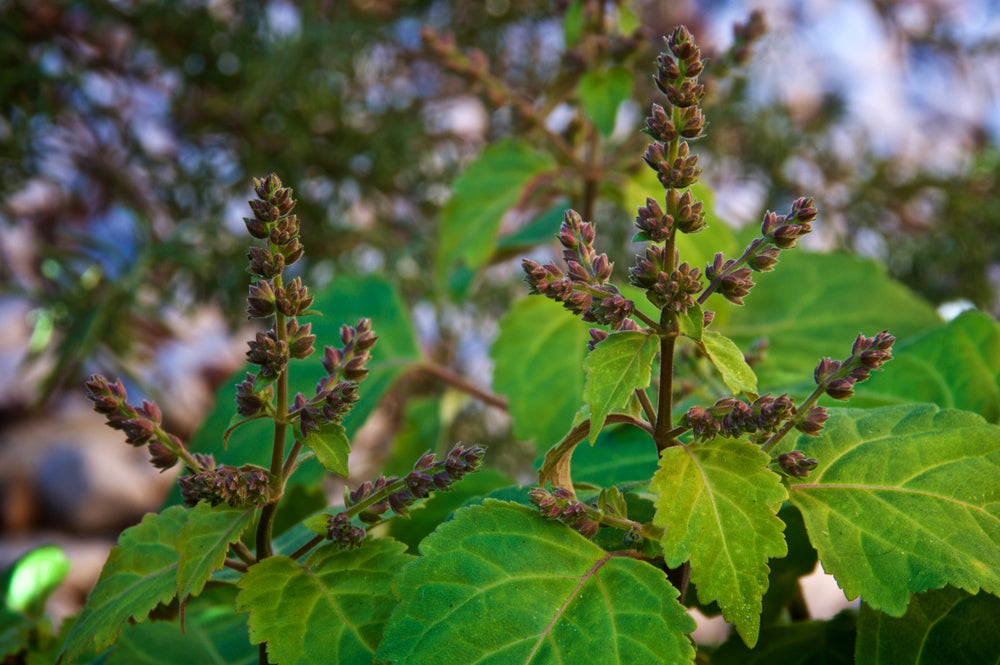What is Patchouli Essential Oil made of?
Patchouli Essential Oil is derived from the leaves of the Patchouli plant (Pogostemon cablin), a member of the mint family that's native to tropical regions of Asia, such as the Philippines, Malaysia, and India.
The beneficial properties of Patchouli Essential Oil are due to its rich phytochemistry. Notably, it contains compounds like patchoulol, α-guaiene, and α-patchoulene, which contribute to its unique earthy aroma and its various health benefits.
- Latin Name: Pogostemon cablin
- Main Country of Origin: Indonesia
- Scent Note Type: Base note with a musky, sweet, and earthy aroma
- Most Popular Usage: Aromatherapy and Perfumery
What are the benefits of using Patchouli Essential oil?
Patchouli Essential Oil has a range of potential benefits:
- Mood Enhancer: It can help uplift moods and alleviate symptoms of stress and anxiety.
- Skin Health: Patchouli oil may improve the appearance of dry skin, acne, or eczema and can help reduce the appearance of wrinkles or scars.
- Natural Deodorant: Its strong scent can help mask body odors.
- Insect Repellent: Its aroma can help repel bugs and insects.
How to use Patchouli Essential Oil?
- Aromatherapy: Add a few drops to a diffuser or use in an oil burner to create a relaxing environment.
- Topical Treatment: Mix it with a carrier oil and apply it to the skin to promote a healthy complexion.
- Perfumery: Its unique, earthy scent is often used in perfumes and personal care products.
How to combine Patchouli Essential Oil with Carrier Oils
Patchouli Essential Oil blends well with carrier oils like jojoba oil, sweet almond oil, and avocado oil. Just mix 2-3 drops of Patchouli Essential Oil with a tablespoon of your preferred carrier oil for topical application.
To create a grounding diffuser blend, add 4-5 drops of Patchouli Essential Oil to the recommended amount of water in your diffuser.
Research based on Patchouli Essential Oil
"Effects of Inhalation Aromatherapy with Patchouli Oil on EEG Activity" (2011): The study suggests that inhaling patchouli essential oil can promote relaxation and reduce nervous tension.
"Chemical Composition and Biological Activities of Fragrant Mexican Copal (Bursera spp.)" (2016): This research looks into the wide-ranging benefits of patchouli, including its antimicrobial and insect repellent properties.
"The Effectiveness of Aromatherapy for Depressive Symptoms: A Systematic Review" (2017): This review highlights the role of aromatherapy, including the use of patchouli oil, in managing depressive symptoms.
Frequently Asked Questions
Q: Is Patchouli Essential Oil safe for all skin types?
A: Yes, but as with all essential oils, it should be diluted with a carrier oil before application. A patch test is recommended for those with sensitive skin.
Q: Can I ingest Patchouli Essential Oil?
A: It depends upon whether the manufacturer has produced the oil to be ingested or purely for topical and aromatic purposes. For example, Avivni's Patchouli Essential Oil has organic and purity certifications, however, we still don't recommend ingesting essential oils without consulting a physician (or holistic physician) simply because every person's body reacts differently. No essential oil should ever be ingested in its pure, undiluted form.
Q: Is Patchouli Essential Oil safe for pets?
A: Cats and dogs are very sensitive to essential oils and many are even harmful or poisonous to them. Diffusers for aromatherapy should be placed high up and not near food and water bowls. There are products especially formulated for pets that have been vetted for safety and diluted to the appropriate strength and we suggest you stick with these. We recommend always checking with a holistic veterinarian before using an essential oil product on your pet.
Q: Can Patchouli Essential Oil be used during pregnancy?
A: Pregnant or nursing women should always consult with a healthcare provider before using any essential oils.
Q: Does Patchouli Essential Oil have a shelf life?
A: Yes, for optimal quality, it's best to use it within 3-4 years of opening.

